|
 Become
a fan on Facebook
Become
a fan on Facebook  Follow
on Twitter Follow
on Twitter
Article by Mark Dujsik | December 23,
2018
Here
are the ten best films of 2018:
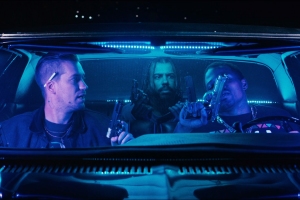 10.
Blindspotting 10.
Blindspotting
So
much of Blindspotting is about
juxtapositions and dualities. Director Carlos López Estrada's debut feature,
coming from stars Daveed Diggs and Rafael Casal's impressive first screenplay,
opens with a split-screen montage of the split within Oakland. Gentrification
has changed and continues to change the face of the city, and against that
backdrop, the film tells the story of two lifelong friends—Collin (Diggs), who
is black, and Miles (Casal), who is white—whose own friendship is about to
undergo a significant change. After spending two months in prison, Collin has
three days left on his probation and witnesses an unjustified police shooting of
a black man. The film follows Collin as he faces the constant feelings of fear
and powerlessness—feelings that Miles, who was as much a participant in the
crime that landed Collin in jail, will never be able to comprehend. The
relationship between the two men is the core of the film, and it comes as little
surprise to learn that Diggs and Casal have been friends since they were
teenagers. The sense of camaraderie between the two characters cannot be faked,
and that makes the inevitable clash between the two even more heartbreaking.
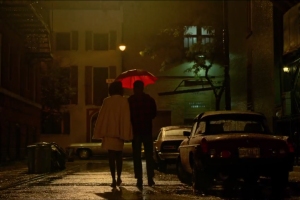 9.
If Beale Street Could Talk 9.
If Beale Street Could Talk
Writer/director
Barry Jenkins has crafted a film of deep, abiding love. Based on James Baldwin's
novel, If Beale Street Could Talk is
the story of a young couple, torn apart by a corrupt criminal justice system.
Tish (KiKi Layne) and Alonzo (Stephan James) have known each other since
childhood, and in flashbacks, we watch how romance and more develops between
them. In the present, Alonzo is in jail, awaiting trial for a crime he couldn't
have committed. Tish is pregnant and devoted to getting the man she was going to
marry out of this system. Jenkins' approach to this tale of love and strife is
tender, compassionate, and all-encompassing. In his use of intimate close-ups,
we can see his admiration for the actors. In the lush imagery (lit by
cinematographer James Laxton) and the jazz-infused score (from Nicholas Britell),
we sense Jenkins' adoration for 1970s New York. The most obvious love on a
filmmaking level, though, is how the filmmaker has translated Baldwin's novel,
intertwining a personal story and political outrage in inseparable ways. Jenkins
lends both the personal and political angles of this tale a feeling of poetry.
It's a poem of injustice and fear and pain, but it is also, above all else, one
of love.
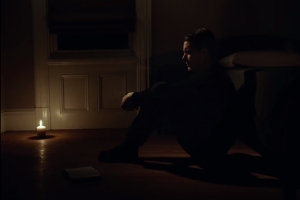 8.
First Reformed 8.
First Reformed
At
one point in First Reformed, Rev.
Ernst Toller (Ethan Hawke) says that wisdom is the ability to hold two opposing
beliefs simultaneously. There's another phrase for that state of mind, and
writer/director Paul Schrader's film finds its strength in the cognitive
dissonance of its main character, its form, and its abundant ideas. The most
prominent case of dissonance is that this is a story about a crisis of faith, in
which the story itself isn't exactly about faith. Toller was once devout in his
religious beliefs, but religion itself appears to have become a crutch for him.
He is in mourning over his former life, and after counselling a member of his
congregation, who believes that the world is on the verge of destruction, Toller
himself becomes obsessed with this way of thinking, too. Schrader's ambitions
here are quite large. The film serves as an examination of how a person may be
drawn toward extremism, a political screed about the environment, and a study of
faith's role in life. It's a harrowing study of Toller's life, portrayed in
claustrophobic compositions and through Hawke's precisely tuned performance.
Schrader doesn't provide answers to Toller or the world's dilemma, which might
be the only resolution we can expect for either.
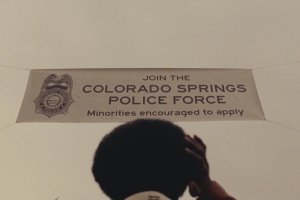 7.
BlacKkKlansman 7.
BlacKkKlansman
BlacKkKlansman
tells a doozy of a story, based on a true one, and serves as an incisive piece
of film analysis. The narrative is about Ron Stallworth (John David Washington),
the first—and, at the time, only—African-American cop with the Colorado
Springs Police Department, who infiltrates the Ku Klux Klan over the phone,
while Flip Zimmerman (Adam Driver), a detective of Jewish descent, serves as his
real-world stand-in. It's an ingenious act of subversion, and the
screenplay—written by director Spike Lee, Charlie Wachtel, David Rabinowitz,
and Kevin Willmott—follows suit. Within this story of the politics and goals
of the racist and violent organization, Lee tracks the history of racism in the
movies and their influence on the real world. Of key significance is D.W.
Griffith's The Birth of a Nation,
which serves as a rallying cry for the members of the KKK of the 1970s, just as
it helped to revive that group upon the movie's release. Lee juxtaposes their
cheers at a lynching with the story of a real one, and in the film's final
sequence, using footage of a far-right rally from 2017, the film reminds us that
the racism, hatred, and anger of the past becomes that of the present.
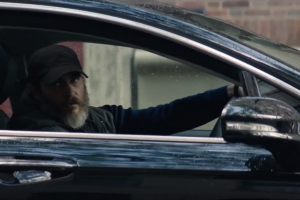 6.
You Were Never Really Here 6.
You Were Never Really Here
Joe
(Joaquin Phoenix) is a killer for hire, known for his brutality and his
specialty of saving children from people who would hurt, abuse, or exploit
innocents. Such a character—a professional assassin, a hired gun, a proficient
hitman—is common in the movies, but writer/director Lynne Ramsay's You
Were Never Really Here presents this character type without the frills, the
sense of a higher purpose, the style, or many words to speak. Joe is little more
than a machine, killing men who would harm children because he's paid to do so.
For him, though, it seems to be a matter of necessity, stemming from a painful
history of abuse. The character may not say much, but Ramsay gives us a
comprehensive understanding of Joe through this fractured narrative. Her style,
which watches Joe work through long takes and simple camera movements,
understands that the man is working on impulse. The plot involves Joe trying to
rescue a girl from a child sex ring, only to uncover a vast conspiracy, but the
film lives inside Joe's head, with nightmarish flashes of his past arriving
without warning. While this may be an unapologetically rough film, it is also
empathetic, portraying the toll of abuse with visceral clarity and moral
uncertainty.
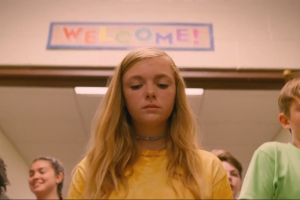 5.
Eighth Grade 5.
Eighth Grade
You
just want to tell Kayla (Elsie Fisher, in an astute and deeply communicated
performance) that everything will be OK. Would she listen? Could we blame her
for ignoring us? Eighth Grade, a film of supreme empathy, features a character whose
concerns are both specifically her own and representative of her age, her
gender, and her status. At the same, it's likely that everyone could find
something about her experience to which to relate. Kayla's story, brought to the
screen in an auspicious debut from writer/director Bo Burnham, is a simple one,
but in that simplicity, there are worlds of hope and despair, of longing and
disappointment, and of love and pain. She's a quiet and shy girl, going through
the final week of her time in middle school. She makes online videos, offering
advice on how to be yourself, how to be confident, and how to make friends. The
rest of the film follows Kayla as she tries—and often fails—to live up to
her own advice. Burnham ensures that there's no wall between Kayla and us,
delving into her life and thought process. He doesn't judge anything about this
character or the time in which she is coming of age, and in that understanding
of and compassion for Kayla and everyone who is or was like her, this is a film
that feels resolutely both of its time and timeless.
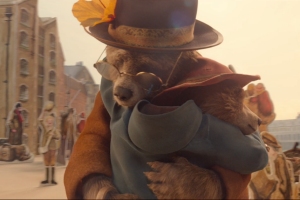 4.
Paddington 2 4.
Paddington 2
The
utterly delightful Paddington 2 feels
like the right film for this moment in time. The main lesson from the
big-hearted bear in the oversized red hat and blue duffel coat is that, "If
we're kind and polite, the world will be right." As naïve as that may
sound, it seems like a particularly good lesson right now. The film actually
challenges Paddington's (voice of Ben Whishaw) worldview through a few
characters and the central obstacle of the plot, and it feels as if there's a
lesson in that, too. After all, if one's outlook on the world isn't challenged,
how can one be certain that it's worthwhile? The story has Paddington trying to
buy a birthday present for his aunt, being framed for robbery (by a silly
villain, played by a very funny and self-deprecating Hugh Grant), and winding up
in prison with hardened criminals. Despite the seemingly darker elements of this
sequel, most of this material is lovely, while never becoming sappy or overly
sentimental. Co-writer/director Paul King is fully invested in Paddington's
worldview and manner, and along the way, he gives us a series of gags inspired
by the physics of cartoons and the logic, as well as the scale, of the great
silent comedies. This funny, encouraging, and surprisingly affecting film is
exactly what a sequel should be—following through on and expanding upon the
core of its predecessor's characters and ideas.
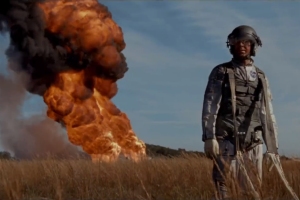 3.
First Man 3.
First Man
For
about 20 minutes, amidst what fellow astronaut Buzz Aldrin called that
"magnificent desolation" of the lunar surface, Neil Armstrong was the
loneliest human being in the universe. The sense of isolation for the first man
to step on the moon must have been unlike any other person who ever lived. First
Man, director Damien Chazelle's biographical account of the astronaut's
career and personal life, puts forth the notion that Armstrong was uniquely
qualified for this task. From what we see in the film, Armstrong, played by Ryan
Gosling (in a rather exceptional performance that keeps everything close to the
chest), spent most of his time alone in his own thoughts. No matter how hard his
friends and family members push him speak what's on his mind, this version of
Armstrong would rather keep his face in his notebook, his mind on the task at
hand, and his eyes always looking toward that glowing orb in the night sky.
Josh
Singer's screenplay jumps through the highlights of the astronaut's career with
the Gemini and Apollo programs (Chazelle's staging of the test flights, filling
the frame with dials and often taking a first-person perspective, is almost
abstract at times), while grounding his personal life in his inability to cope
with the death of his young daughter (Claire Foy plays Armstrong's wife Janet,
in a role that's much more than the worried wife at home). This is not a
flattering picture of Armstrong as the explorer hero. It's a more authentic
depiction of the professional, logistical, and personal challenges that he
endured.
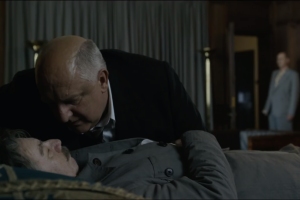 2.
The Death of Stalin 2.
The Death of Stalin
As
unlikely as it may seem, the constant fear of arrest, exile, or execution is the
foundation of the humor in co-writer/director Armando Iannucci's The
Death of Stalin. We're not laughing at these powerful men, capable of great
evil and constantly scheming to climb the ladder of influence within the Soviet
Union, or the horrors of the system they control. Well, we are, in a way, but
Iannucci, along with his fellow screenwriters David Schneider and Ian Martin, is
more concerned with joking about the absurdity of this political world, the
mindset of complete devotion to one man, and, when that man is lying unconscious
in a puddle of his own urine, the chaotic machinations and cognitive dissonance
of people trying to replace a man whom those same people claim to be
"irreplaceable."
The
rogues' gallery includes Nikita Khrushchev (Steve Buscemi), Lavrenti Beria
(Simon Russell Beale), Georgy Malenkov (Jeffrey Tambor), and Vyacheslav Molotov
(Michael Palin), who offer theatrical displays of grief when Stalin (Adrian
McLoughlin), "the old man," is near death after suffering a stroke.
Almost immediately, the conspiring and back-stabbing begin. The film is ruthless
in its dissection of these people. There's no political ideology here, only the
desire for power. The film is brutally funny, but at times, it's also simply
brutal. For as much bumbling as there is within the inner circle of the Soviet
government, Iannucci reminds us that the one thing these people could get right
is systematic detention and murder. It's a tremendous balancing act, which
allows us to laugh at the mentality that gave rise to this system without making
light of its consequences.
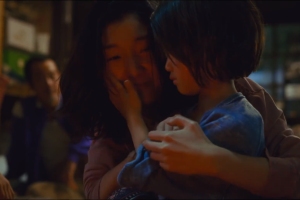 1.
Shoplifters 1.
Shoplifters
The
best film of 2018 is writer/director Hirokazu Kore-eda's stunningly humanistic
and emotionally resonant Shoplifters.
This examination of family tells a deceptively simple story that gradually
reveals layers upon layers about its characters, their pasts, their
relationships, and how, in general, we connect as people. These characters are
together as a means of survival, and in directly contradicting the usual and
socially accepted meaning of the word "family," Kore-eda shows how
some bonds can be stronger than those of mere blood and lineage. That is
especially true among people that society has declared as outcasts. There's no
such judgment on Kore-eda's part. After all, to look down upon those who must
live by and in unorthodox means is to deny their humanity—or, worse, our own.
The
family is composed of Osamu (Lily Franky) and his wife Nobuyo (Sakura Ando), as
well as the family's maternal grandmother Hatsue (Kirin Kiki) and Nobuyo's
younger sister Aki (Mayu Matsuoka). There are two children: a pre-teen boy named
Shota (Jyo Kairi), whom Osamu calls his son but who does not call the man his
father, and a young girl named Yuri (Miyu Sasaki), whom the family brings in
from the cold to raise as their own. We get a fine sense of each of these
characters as the observational story, about making or stealing a living and
bonding, unfolds. The truth about the foundation of this family is eventually
revealed, and it's shattering.
Whatever
familial relationships they may or may not possess, there's genuine love here.
The film ends with a single word that breaks the heart and a single look that
puts it together again. That's how masterfully nuanced and wholly empathetic
Kore-eda's filmmaking is here.
Honorable Mention:
The
Ballad of Buster Scruggs, Bisbee
'17, Burning, Custody,
Filmworker, Free
Solo, Hereditary, Lean
on Pete, Maquia: When the
Promised Flower Blooms, Minding
the Gap, Monsters and
Men, The
Strangers: Prey at Night, They
Shall Not Grow Old, Three
Identical Strangers, What
They Had, Whitney
Copyright © 2018 by Mark Dujsik. All
rights reserved.
 Back
to Home Back
to Home
|
Buy Related Products

|
